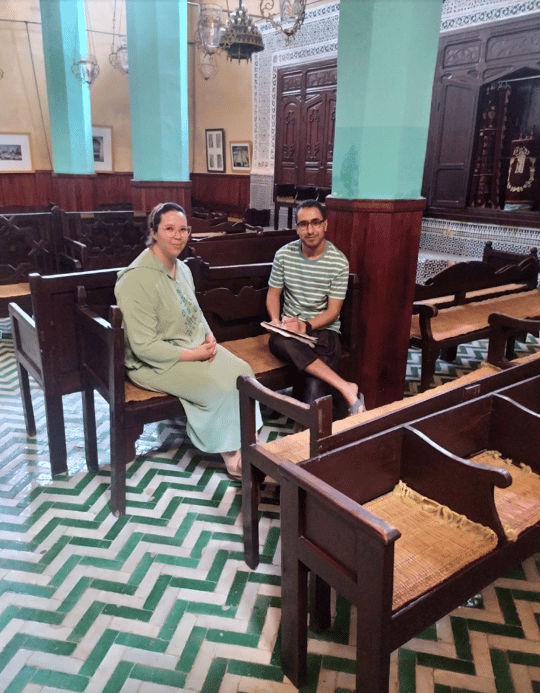Fatima-Zahra El Majdoubi: The Caretaker of Ibn Danan Synagogue

World Interfaith Harmony Week
An Interview with Fatima-Zahra El Majdoubi: The Caretaker of Ibn Danan Synagogue in Fes
Fes, Morocco
“Being assigned to take care of the synagogue was an honor for me. I feel like I held the torch that my father had carried for years to keep the synagogue intact. After my father’s death, the Jewish community in Fes assigned me this task, and I felt honored to be entrusted with such a sacred job.”
– Fatima-Zahra El Majdoubi

Dakira Cultural Coordinator Mohammed Chadli interviews Fatima Zahra at Ibn Danan Synagogue, Fes, Morocco. Photo: HAF
Hundreds of years of religious solidarity are preserved in the Mellah of Fes, the oldest Jewish quarter in Morocco. The Ibn Danan Synagogue in Fes, one of the city’s major components of its vibrant interreligious past, is being maintained by a Muslim family.
The synagogue dates back to the 17th century and is considered the oldest Jewish “Megorashim” synagogue in Morocco. It was founded by the Ben Sidan family, and the last Jewish family to look after it was called Ibn Danan, hence the name.
Fatima Zahra’s father was the main caretaker of the synagogue and spent over 30 years caring for it. The synagogue endured two major restorations: one in the 1870s and the other in the 1990s. The site reopened in 1999. “The synagogue was being maintained by my father, Ba Omar. He passed away in 2019, and I took on this role because I used to spend most of my time with my father when he used to look after this place. So I know how to manage things here.”
She added: “I believe that I didn’t choose this job, but, rather, I was chosen for it given the amount of time I spent here. I’m 36 years old now, but I was only 15 when I used to stand in for my father when he was traveling. We used to spend time here together, during which he taught me ways to welcome visitors and walk them through the history of the synagogue. I grew up watching him take care of this place, but I wasn’t much aware of its sacredness for the Jewish people. When I became an adult, I realized that my father carried a huge responsibility.”
While touring the space, one could glimpse the city’s ever-present pluralistic past. The building’s architecture features a combination of Islamic and Jewish art with wooden arched doors bordered by Moroccan tiles. “Actually, many people frequently visit the synagogue. I always receive groups and individuals from different countries and faiths; not only Jewish visitors, but also people of other faiths. For me, it’s a shared Moroccan heritage that we ought to promote and preserve.”
“I heard some stories from my aunt about her memories with a Jewish family with whom she shared the same house in the Mellah, and every afternoon, they would come together for an afternoon tea.”
According to Fatima Zahra, the safeguarding of such places of memory is a shared responsibility. “We ought to join forces with schools, civil society organizations, parents, and teachers to educate the younger generation about the importance of preserving these sites because they are a living proof of our country’s vibrant multicultural past. We should strive to reconnect our youth with Morocco’s past so that we maintain our shared heritage that our ancestors passed on to us.”

Ibn Danan Synagogue, Fes, Morocco. Photo: Mohammed Chadli/HAF
Fatima Zahra is one of the many Muslim guardians of Moroccan Jewish sacred sites who takes pride in their job. “When you arrive here, you find a Jewish synagogue at the heart of a Muslim neighborhood, and a Muslim family has been taking care of it for years. I believe that Morocco can serve as a model of interfaith harmony for the rest of the world.”
—
This article is part of a series of interviews that celebrates Interfaith Harmony Week (February 1-7, 2023) and have been facilitated by the USAID Dakira program, which is implemented by the High Atlas Foundation and its partners and aims to strengthen inter-religious and inter-ethnic solidarity through community efforts that preserve cultural heritage in Morocco.
The article was completed with the support of the United States Agency for International Development (USAID), and the High Atlas Foundation is solely responsible for its content, which does not necessarily reflect the views of USAID or the Government of the United States.